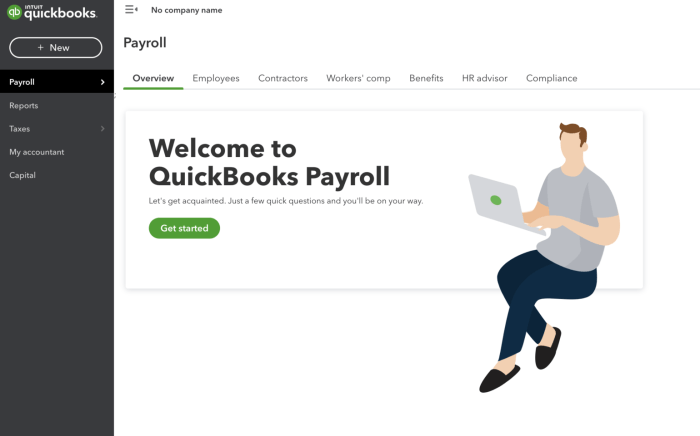Scheduling software compatible with quickbooks – Streamlining your business operations is key to success, and effective scheduling plays a crucial role. For businesses using QuickBooks, selecting scheduling software compatible with the platform can significantly improve efficiency and productivity. This guide dives deep into the world of QuickBooks scheduling software, helping you navigate the options and choose the perfect solution for your needs. We’ll explore key features, benefits, and considerations to make an informed decision.

Source: workshopsoftware.com
Understanding the Importance of QuickBooks Scheduling Integration
Integrating scheduling software with QuickBooks offers a powerful synergy. Instead of juggling multiple platforms and spreadsheets, a seamless integration allows for real-time data synchronization. This means accurate tracking of appointments, streamlined invoicing, and automatic updates across all your crucial business tools. This not only saves time but also minimizes the risk of errors, leading to improved financial management and customer service.
Key Benefits of QuickBooks Scheduling Integration, Scheduling software compatible with quickbooks
- Automated Invoicing: Automatically generate invoices based on scheduled appointments, saving time and reducing manual errors.
- Real-time Data Synchronization: Keep your QuickBooks financials and scheduling information consistently updated, preventing discrepancies and improving accuracy.
- Improved Customer Service: Offer seamless appointment scheduling and reminders, enhancing customer satisfaction and loyalty.
- Enhanced Staff Productivity: Provide staff with efficient scheduling tools to optimize their time and manage appointments effectively.
- Reduced Administrative Overhead: Automate tasks and streamline workflows, leading to significant cost savings in the long run.
Top QuickBooks Scheduling Software Options: Scheduling Software Compatible With Quickbooks
Several excellent scheduling software options seamlessly integrate with QuickBooks. The ideal choice depends on your specific business needs, size, and budget. Some popular choices include (but are not limited to):
Option 1: [Example Software Name]
This software boasts a user-friendly interface and a range of features tailored to various business types. It excels at handling appointments, client communication, and invoicing directly within the platform. Detailed integrations and customizable reports are common highlights.
Option 2: [Example Software Name 2]
Known for its robust reporting capabilities and ability to handle complex scheduling needs, this option is well-suited for larger businesses. Its QuickBooks integration often includes automated financial reporting features.
Option 3: [Example Software Name 3]
Ideal for businesses with specific industry requirements, this software often provides industry-specific features and templates. Ensure compatibility with your QuickBooks version to avoid potential issues.

Source: techrepublic.com
Factors to Consider When Choosing Scheduling Software
- Scalability: Choose software that can adapt to your business’s growth and evolving needs.
- Ease of Use: Prioritize user-friendliness for both staff and clients.
- Customization Options: Consider features that allow you to tailor the software to your specific workflows.
- Pricing and Support: Compare pricing models and evaluate the level of customer support provided.
- Integration Quality: Verify the reliability and stability of the QuickBooks integration to avoid data discrepancies.
Frequently Asked Questions (FAQ)
Here are some frequently asked questions about QuickBooks scheduling software:

Source: thoughtfulsystems.com
- Q: How much does QuickBooks scheduling software cost?
A: Pricing varies significantly based on the chosen software, features, and subscription model. Contact providers directly for specific pricing details.
- Q: Can I try the software before purchasing?
A: Many providers offer free trials or demonstrations to evaluate the software before committing to a purchase.
- Q: How can I ensure data accuracy during the integration process?
A: Carefully follow the integration instructions provided by the software vendor. Double-checking data synchronization after setup is crucial. If needed, seek technical support for troubleshooting.
Conclusion and Call to Action
Choosing the right QuickBooks scheduling software is a crucial step in optimizing your business operations. By carefully evaluating your needs, comparing options, and considering the factors Artikeld in this guide, you can select the ideal solution to enhance productivity, streamline workflows, and boost overall business success.
Ready to take the next step? Visit our website or contact us today to explore the best QuickBooks scheduling software options and discover how you can unlock greater efficiency for your business.
Sources: [Insert Links to reputable sources here, e.g., QuickBooks website, software vendor websites]
User Queries
What are some common QuickBooks integrations for scheduling software?
Several popular scheduling software options offer QuickBooks integrations, allowing for automated data transfer and improved workflow. Examples include [Insert examples of popular scheduling software and their QuickBooks integration features here].
How much does scheduling software compatible with QuickBooks typically cost?
Pricing varies greatly depending on the specific features and functionalities of the scheduling software. Factors such as the number of users, add-on features, and subscription tiers influence the overall cost. It’s recommended to contact providers directly for accurate pricing information.
What are the key benefits of using scheduling software integrated with QuickBooks?
The key benefits include improved efficiency through automation, reduced manual data entry errors, better time management, and more accurate financial reporting. Ultimately, these benefits lead to increased profitability and a smoother overall workflow.